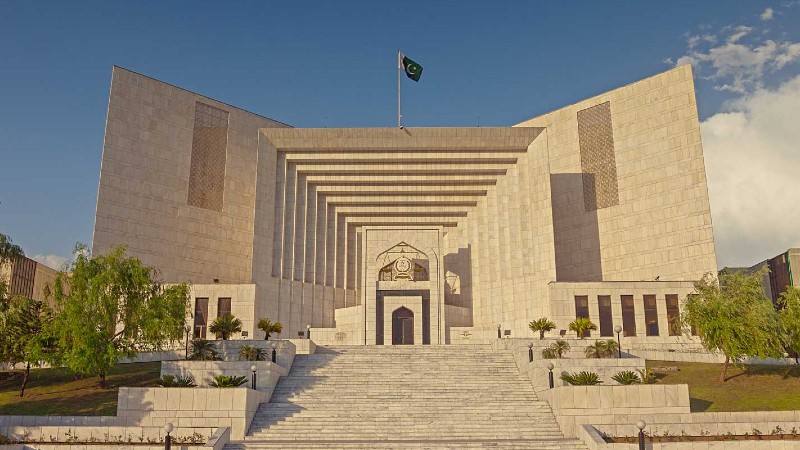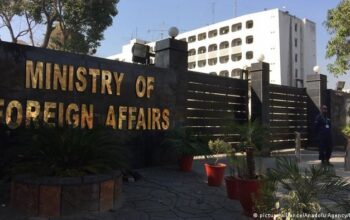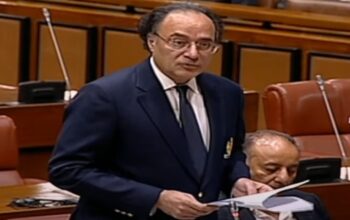As it took up Imran Khan’s challenge against the government’s amendments to NAB law, the apex court weighed its power of judicial review against the principle of parliamentary supremacy.
By Naveed Naqvi
ISLAMABAD: The Chief Justice of Pakistan (CJP) Tuesday used his platform as the head of a three-member bench of the country’s apex court to urge former Prime Minister Imran Khan’s Pakistan Tehreek-e-Insaf (PTI) to return to the National Assembly and play its role in legislation in the national interest.
Headed by CJP Umar Ata Bandial and including Justice Ejazul Ahsan and Justice Mansoor Ali Shah, the bench is ceased with the hearing of a challenge against a raft of amendments introduced to the National Accountability Bureau (NAB) law by the incumbent government.
The challenge has been brought by PTI chairman and former Prime Minister Imran Khan under Article 184(3) of the Constitution, which enables the apex court it to assume jurisdiction of matters involving a questions of public importance with reference to the enforcement of any of the fundamental rights of the citizens.
This was the first hearing of Khan’s challenge, originally thrown out by the registrar, but later admitted by Justice Ejazul Ahsan after a chamber hearing on maintainability. For much of today’s hearing, the bench found itself mired in a debate over the principle of parliamentary supremacy and how to apply it to the extant case.
Justice Bandial and Justice Shah grilled the petitioner’s counsel as to whether the court would be encroaching on parliamentary turf by entertaining the challenge, their common refrain being how the court could step into the shoes of parliament.
The matter relates to some 25 amendments introduced to the NAB law, originally passed by the National Assembly and Senate separately as National Accountability (Amendment) Bill, 2022. The parliament threw its full weight behind the bill by passing it in a joint sitting on June 9 after President Arif Alvi, a Khan nominee, declined to sign it into law.
The bill gained the force of law on June 19, 2022 – ten days after its passage from the joint sitting, irrespective of the President’s signature.
Justice Bandial asked PTI vice chair Shah Mahmood Qureshi to take the stand and explain why his party had not opposed the amendments in parliament.
“Where were you when the NAB amendments were being made?” the CJP asked, adding. “I think your lawyer has raised very good points. We will issue notices to the parties on these points. You have to be prepared for the next hearing. You have to satisfy the court why this matter should not be debated in parliament
“How many PTI members are there in the parliament?” Justice Bandial continued. “Think for the sake of the country, the nation, the constitution. We realize that because of these cases, the common man who comes to the court is affected.
Qureshi said that the NAB amendments were discussed in the parliamentary committee for several hours. “I was a member of the committee when the NAB law was being made, the NAB law was discussed in detail in the committee.”
Parliament is supreme under the Constitution of Pakistan – which nonetheless vests the power of judicial review in the Supreme Court of Pakistan with view to safeguarding its federal, parliamentary, and Islamic character.
Khawaja Haris argued that the accountability courts will no longer accept evidence from abroad as part of Mutual Legal Assistance (MLA) under the United Nations Convention against Corruption (UNCAC) after the new amendments. He said this would result in all cases of fake bank accounts being closed down.
Besides admissibility of evidence under MLA, his apprehensions included assets beyond means, misuse of authority by officials, and the definition of benami.
Opposing the plea of PTI, the Additional Attorney General took a stand that the amendments have been challenged in the Islamabad High Court, and it would be appropriate to let the High Court decide first.
The CJP remarked that the matter may ultimately be referred to parliament.
Later, the Supreme Court issued a notice to the Attorney General and adjourned the hearing of the matter to 11 o’clock on Friday, July 29.
Copyright © 2021 Independent Pakistan | All rights reserved




